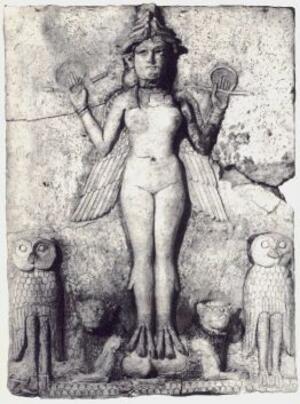In the beginning, the Lord God formed Adam and Lilith from the dust of the ground and breathed into their nostrils the breath of life. Created from the same source, both having been formed from the ground, they were equal in all ways. Adam, being a man, didn’t like this situation, and he looked for ways to change it. He said, “I'll have my figs now, Lilith,” ordering her to wait on him, and he tried to leave to her the daily tasks of life in the garden. But Lilith wasn't one to take any nonsense; she picked herself up, uttered God's holy name, and flew away. “Well now, Lord,” complained Adam, “that uppity woman you sent me has gone and deserted me.” The Lord, inclined to be sympathetic, sent his messengers after Lilith, telling her to shape up and return to Adam or face dire punishment. She, however, preferring anything to living with Adam, decided to stay where she was. And so God, after more careful consideration this time, caused a deep sleep to fall on Adam and out of one of his ribs created for him a second companion, Eve.
For a time, Eve and Adam had a good thing going. Adam was happy now, and Eve, though she occasionally sensed capacities within herself that remained undeveloped, was basically satisfied with the role of Adam's wife and helper. The only thing that really disturbed her was the excluding closeness of the relationship between Adam and God. Adam and God just seemed to have more in common, both being men, and Adam came to identify with God more and more. After a while, that made God a bit uncomfortable too, and he started going over in his mind whether he may not have made a mistake letting Adam talk him into banishing Lilith and creating Eve, seeing the power that gave Adam.
Meanwhile Lilith, all alone, attempted from time to time to rejoin the human community in the garden. After her first fruitless attempt to breach its walls, Adam worked hard to build them stronger, even getting Eve to help him. He told her fearsome stories of the demon Lilith who threatens women in childbirth and steals children from their cradles in the middle of the night. The second time Lilith came, she stormed the garden's main gate, and a great battle ensued between her and Adam in which she was finally defeated. This time, however, before Lilith got away, Eve got a glimpse of her and saw she was a woman like herself.
After this encounter, seeds of curiosity and doubt began to grow in Eve's mind. Was Lilith indeed just another woman? Adam had said she was a demon. Another woman! The very idea attracted Eve. She had never seen another creature like herself before. And how beautiful and strong Lilith looked! How bravely she had fought! Slowly, slowly, Eve began to think about the limits of her own life within the garden.
One day, after many months of strange and disturbing thoughts, Eve, wandering around the edge of the garden, noticed a young apple tree she and Adam had planted, and saw that one of its branches stretched over the garden wall. Spontaneously, she tried to climb it, and struggling to the top, swung herself over the wall.
She did not wander long on the other side before she met the one she had come to find, for Lilith was waiting. At first sight of her, Eve remembered the tales of Adam and was frightened, but Lilith understood and greeted her kindly. “Who are you?” they asked each other, “What is your story?” And they sat and spoke together of the past and then of the future. They talked for many hours, not once, but many times. They taught each other many things, and told each other stories, and laughed together, and cried, over and over, till the bond of sisterhood grew between them.
Meanwhile, back in the garden, Adam was puzzled by Eve's comings and goings, and disturbed by what he sensed to be her new attitude toward him. He talked to God about it, and God, having his own problems with Adam and a somewhat broader perspective, was able to help out a little—but he was confused, too. Something had failed to go according to plan. As in the days of Abraham, he needed counsel from his children. “I am who I am,” thought God, “but I must become who I will become.”
And God and Adam were expectant and afraid the day Eve and Lilith returned to the garden, bursting with possibilities, ready to rebuild it together.
Excerpt from: Plaskow, Judith. “The Coming of Lilith.” In Four Centuries of Jewish Women’s Spirituality: A Sourcebook. Ed. Ellen M. Umansky and Dianne Ashton. Boston: Beacon Press, 1992. Reprinted with permission of the author.




Beautiful work. Immaculate delivery.
I'm Lilith
Iv been reading about what you wrote Lilith and for the past 6 years..Lots of home work on her only..and your right on..I have tons of info about lilith..I see her everyday in women..very easy..Thank you for all you do..
great work